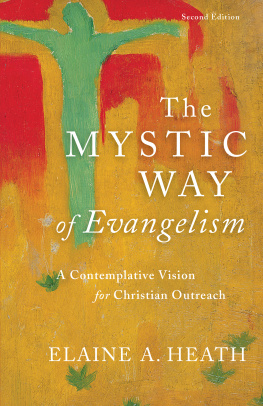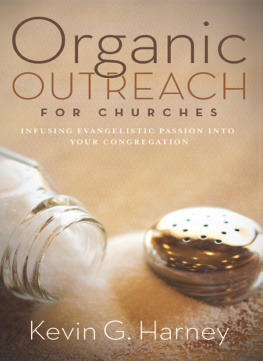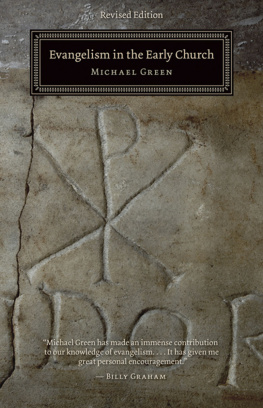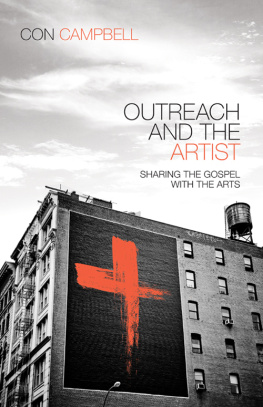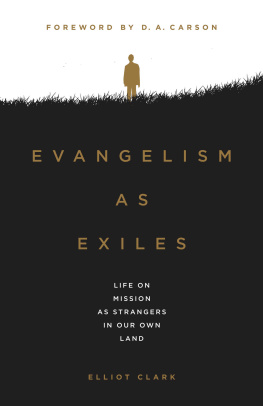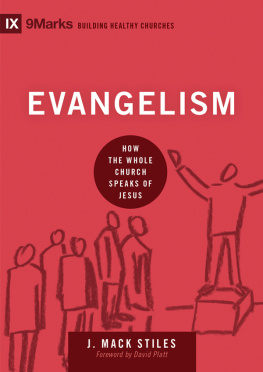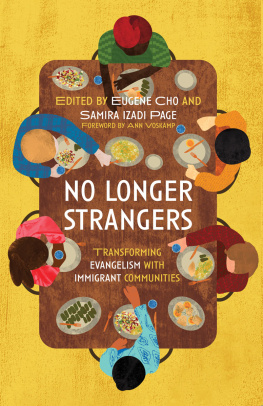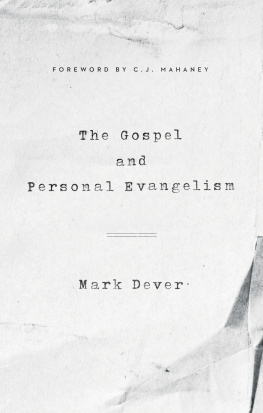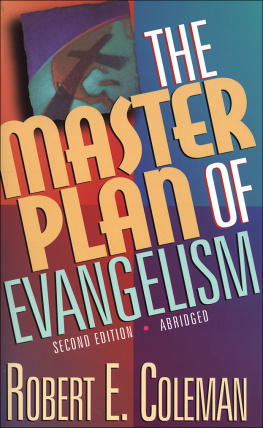1. Into the Night
2. Love Is Gods Meaning
3. Broken Bread and Poured-Out Wine
4. Coming Home to Love
5. Healing the Threefold Wound
6. Redeeming the Earth
7. A Hermeneutic of Love
8. Giving Ourselves Away
9. Homing Prayer
10. New Tongues of Fire
11. Your Will Be Done on Earth
Preface
It has been ten years since I wrote The Mystic Way of Evangelism. Around the time of its publication I launched a small cluster of experimental Christian communities with some of my students and friends in Dallas, in which we practiced the theology of The Mystic Way . Those first microcommunities soon gave birth to a nonprofit organization, the Missional Wisdom Foundation, which now serves in four regional hubs across the United States. The Missional Wisdom network of intentional communities, social enterprises, missional microchurches, and educational programs are all expressions of new forms of theological education that connect to established churches and educational institutions. The Mystic Way of Evangelism became a foundational text for this pioneering work in the church and theological education, along with subsequent books I wrote or cowrote emerging from this volume, especially Longing for Spring: A New Vision for Wesleyan Community (coauthored with Scott T. Kisker), Missional. Monastic. Mainline: A Guide to Starting Missional Micro- Communities in Historically Mainline Traditions (coauthored with Larry Duggins), and God Unbound: Wisdom from Galatians for the Anxious Church .
During the past several years I have also had the privilege of traveling around the world, where I have been able to meet, learn from, communities, new monastic networks, and other emerging expressions of church. I have been gifted with the opportunity to teach and learn from many congregations, regional and national gatherings of clergy, and gatherings of bishops and other judicatory leaders. I have worked closely with church-planting organizations, especially Path One of the United Methodist Church.
Throughout these travels and in my on-the-ground ethnographic research in the Missional Wisdom hubs, it has become very clear that the North American church of the future will be different from the church of the twentieth century. There will be much more bivocationality among the leaders. Institutional structures of denominations will shrink and, in some cases, merge with other denominations. Faith communities are likely to be smaller, and will include more decentralized networks, although some megachurches will continue to exist, especially in urban areas of the South. Established churches that do survive and thrive in the future will do so because they figure out how to connect missionally in their own context, in ways that are noncoercive, nonviolent, and nonmanipulative. They will connect through loving their neighbors well.
Questions of diversity, difference, and equality will be crucial to the churchs vitality. While fundamentalisms of various kinds will flourish during periods of political and economic upheaval, as was the case during the change of the US presidential administration in 2016, the church that reflects gospel priorities in the future will be the church that pays attention to issues of social and environmental justice in the name and spirit of Jesus. Just as the nineteenth-century Holiness movement birthed social reforms that changed the landscape of North America, Christian movements for human rights, civil rights, and environmental justice will become stronger and more influential during the next decade of the twenty-first century.
Theological education has already begun to undergo significant shifts to make it more contextually grounded and more affordable and accessible. Many seminaries and schools of theology will close in the years ahead because they cannot or will not make the necessary changes fast enough. Those that survive will do so because they take seriously the deep cultural shifts of society at large, with their impact on changing leadership needs in the church.
Finally, the church in North America will probably lose its remaining government benefitssuch as tax-exempt status and the ministers housing allowance. It may be that individuals will no longer be able to claim income-tax deductions for tithing. If these changes take place, they will have a significant impact on the financial viability of congregations.
My conviction is that God will sustain the one holy, catholic, apostolic church, come what may. The shape of the church may change. The center of Christianity has already changed, moving to the global South and East. The message of the gospel will not. May this book in some small way contribute to the strengthening of the saints, mystics, and yes, martyrs of our daythe men and women who give themselves fully to God in union with Gods work in the world.
. http://www.missionalwisdom.com.
. For Fresh Expressions in the United Kingdom see http://www.freshexpressions.org.uk. In the United States see http://freshexpressionsus.org.
Acknowledgments
In so many ways this book reflects the wisdom and love of those who have joined me in my journey. I especially want to thank my dear friends the late Betty Jeavons, Morven and David Baker, Jerry Flora, Mary Ellen Drushal, and John Jorden. Mind-sharpening, soul-enriching conversations with colleagues have been invaluable, especially those with William Thompson-Uberuaga and William J. Abraham. I am so grateful to have worked with diverse and incredibly gifted colleagues at Perkins School of Theology as I wrote the first edition of this book. In the revised and updated edition my gratitude extends to colleagues at Duke Divinity School as well as many pastors, lay leaders, bishops, and others across the United States and around the world for rich conversations and innovative ministry that is emerging and that connects deeply with the themes of this book. Much of the work that I have done in this volume began in discussions with my students, who ask wonderful, difficult questions and who teach me far more than I teach them. Along those lines I especially appreciate the probing questions of former students JoAnn Shade, Nick Swirski, Abril Goforth, Betsy Randall, Ryan Klinck, Geoffrey Moore, Brandon Lazarus, Ceciliah Igweta, Jacob Keega, Adam White, Jonathan Grace, George Battle, Amy Proctor, Amy Spaur, Shellie Ross, Vance Goodman, Larry Duggins, Bret Wells, and many others. My heartfelt thanks go to my graduate assistants at Perkins/SMU, Mark Teasdale and Ken Loyer, who helped with the original text, and to my research assistant at Duke, Brent Levy, who helped with the revision. Many thanks are also due to my editors at Baker Academic, especially Jim Kinney. I am indebted more than I can express to faithful intercessors who prayed for me as I wrote.

